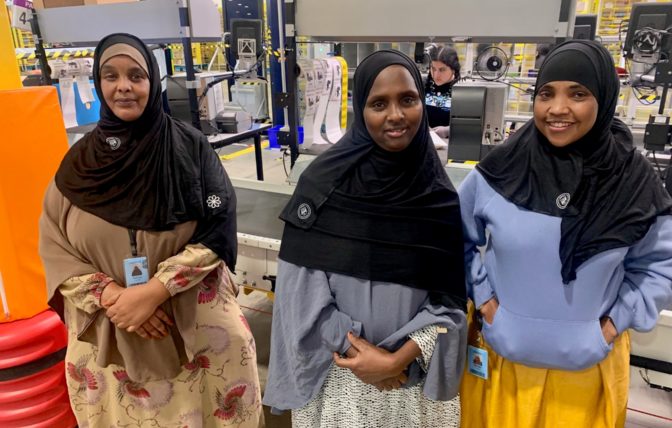
 "
"

 "
"

In an effort to cultivate an environment of inclusivity, Amazon, the prominent US retail giant, has joined forces with Henna and Hijabs to offer hijabs for its Muslim workforce.
Taking this stride towards fostering diversity, the SMN1 facility located in Brooklyn Park has taken the lead as the inaugural Amazon site to introduce branded hijabs. The partnership’s core objective is to create a workplace where Muslim women feel a profound sense of belonging.
Henna and Hijabs, helmed by its founder Hilal Ibrahim, stands resolute in its commitment to bridging the accessibility gap that is often experienced by Muslim women in various spaces. Ibrahim shared her aspirations, stating, “Henna and Hijabs is devoted to addressing the accessibility challenges that Muslim women frequently encounter in different settings.”
With the formal introduction of this partnership, SMN1 has become a trailblazer in adopting the Amazon-branded hijab, evoking jubilation among the Muslim community. Ryan Mohamad, an Amazon employee at SMN1, conveyed her ineffable joy, sharing, “I cannot truly convey my happiness and excitement through words.” Mohamad donned her hijab adorned with the Amazon logo—a product of an 18-month endeavor to incorporate hijab into the realm of apparel choices.
Building Bridges
Ryan’s elation is emblematic of Hilal’s pride in bridging gaps for Muslim women. Hilal envisions this partnership as a conduit to cultivate a profound sentiment of inclusion and belonging among all members. She reflected on the honor of fulfilling this need, expressing, “What an incredibly humbling honor to be able to fill this need.”
The Amazon-branded hijab initiative joins a series of efforts by Amazon to accommodate its Muslim workforce. In October of the previous year, Amazon inaugurated a new sorting facility equipped with ablution and prayer spaces to cater to the needs of Muslim employees. This facility emerged nearly four years after a group of Muslim Somali workers in Minnesota staged a protest, advocating for improved working conditions within the retailer’s warehouses.
With over 100 fulfillment centers spread across the United States, Amazon sustains a workforce of more than 125,000 full-time employees. The state of Minnesota, encompassing a population of nearly six million individuals, accommodates a Muslim community of less than 1%, with over 30 mosques serving this demographic across the northern region of the state.